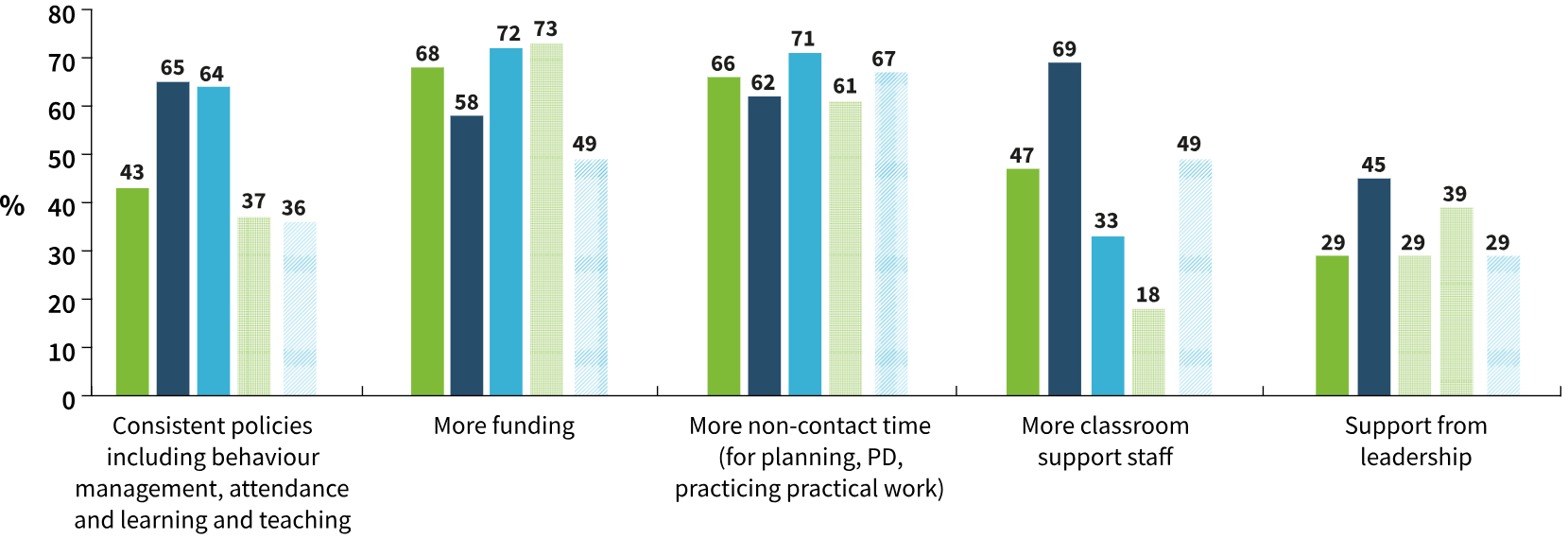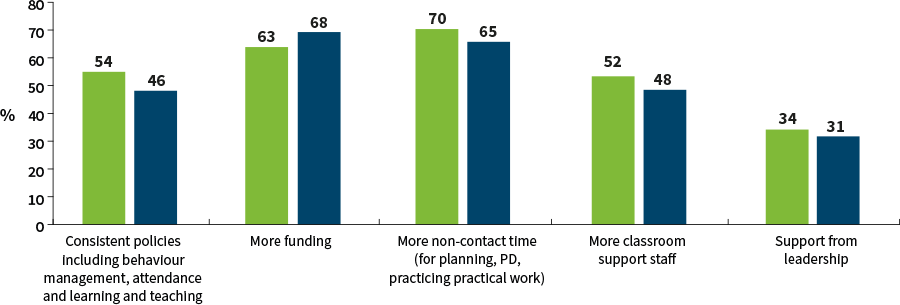![]()
Now, thinking generally, what one change to the education system do you think would have the biggest positive impact in science teaching in your nation?
[With more funding] We could afford to have science labs for every lesson. And do practicals where they support learning. To get cover to go on training courses. To arrange school trips. To allow staff adequate non-contact time to keep abreast of developments. To afford laptops or iPads to use in class. To have Wi-Fi that would support them. To use modern AFL strategies to assess all student understanding and provide individual support.
![]()
In the survey, we asked: "What one change to the education system do you think would have the biggest positive impact in science teaching in your nation?"
‘Funding’ was regularly cited in teachers’ responses:
Increased funding from the government, both to schools so that equipment and resources can be afforded and pay for staff to attract and retain science teachers.
Funding – make funding for schools more so we can offer the subjects and buy the equipment and consumables. Fund teachers' salaries so it is an attractive career and uptake in numbers increases. You can't teach good science if you don't have good staff.
Funding to provide more teachers, reducing class sizes, therefore improving experience of the student in classroom.
Increased funding – both to allow the purchase of equipment required for learning and teaching (e.g. microscopes, glassware), and to allow teachers to have more non-contact time because they're not made to do cover; also for pupil support assistants so that we can better meet the needs of learners during science teaching.
![]()
Now, thinking generally, what one change to the education system do you think would have the biggest positive impact in science teaching in your nation?
Honestly, more funding. We are really struggling to retain staff who move into the private sector for higher wages. And our budget is cut year after year and we are unable to run the practicals we would like to outside of required practicals because we cannot afford to replace chemicals or maintain equipment.
More funding for staff; both teaching and technicians. Stretched staff do not currently have the capacity to make more practical science happen. Courses struggle to be finished each year and periods per week are being cut across the whole timetable for upper school qualifications, another barrier to practical 'hands on' science education.
Less content, more time to explore the subject linking to real life and practicals.
Funding and recognition of the role technicians play in improvements within the practical provision. Improving the training and career structure for technicians to encourage them to invest in their schools and futures.

What we are doing
We continue to develop new and practical ways to help teachers and technicians create engaging learning experiences for their students.
Why not try our , which can help make budgets go further. They require smaller amounts of chemicals without compromising educational value. By producing less waste, they’ll also help you reduce the environmental footprint of practical chemistry in lessons.
Explore our diverse and flexible , including self-led options, which are designed to integrate with your teaching schedule. Wherever possible, we partner with organisations across the UK and Ireland to provide funding for teachers and technicians to attend in-person training.
You may be eligible for our grants and funding:
- supports collaborative projects to improve chemistry teaching and foster effective teaching communities
- Outreach Fund could help you develop chemistry-based enrichment activities
- funds small educational projects
- RSC members get access to other funding opportunities and benefits.
Through our policy work, we will continue to push for every child to experience practical chemistry in their lessons.
Explore the full data set behind the ����ֱ��app���� Teaching Survey 2023
![]() Download questions and data explainer
Download questions and data explainer
Data tables
You can download all data tables by using the form below. Your data will be used to help us measure engagement depth, not to send unsolicited email communications, and will be retained for 12 months.
Download data tables














